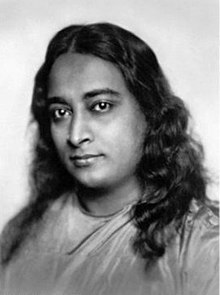CZ:Featured article/Current: Difference between revisions
imported>Chunbum Park m (→Overview) |
imported>John Stephenson (template) |
||
| (120 intermediate revisions by 5 users not shown) | |||
| Line 1: | Line 1: | ||
{{:{{FeaturedArticleTitle}}}} | |||
<small> | |||
{{ | ==Footnotes== | ||
=== | |||
{{reflist|2}} | {{reflist|2}} | ||
</small> | |||
Latest revision as of 09:19, 11 September 2020
Paramhansa Yogananda (5 Jan 1893–7 Mar 1952) was one of the first Indian teachers from the Hindu spiritual tradition to reside permanently in the West, and in particular, he was the first to teach yoga to Americans. He emphasized the universality of the great religions, and ceaselessly taught that all religions, especially Hinduism and Christianity, were essentially the same in their essence. The primary message of Yogananda was to practice the scientific technique of kriya yoga to be released from all human suffering.
He emigrated from India to the United States in 1920 and eventually founded the Self-Realization Fellowship there in Los Angeles, California. He published his own life story in a book called Autobiography of a Yogi, first published in 1946. In the book, Yogananda provided some details of his personal life, an introduction to yoga, meditation, and philosophy, and accounts of his world travels and encounters with a wide variety of saints and colorful personalities, including Therese Neumann, Mohandas K. Gandhi, Luther Burbank, and Jagadis C. Bose.
Paramhamsa, also spelled Paramahamsa, is a Sanskrit title used for Hindu spiritual teachers who have become enlightened. The title of Paramhansa originates from the legend of the swan. The swan (hansa) is said to have a mythical ability to sip only the milk from a water-and-milk mixture, separating out the more watery part. The spiritual master is likewise said to be able to live in a world like a supreme (param) swan, and only see the divine, instead of all the evil mixed in there too, which the worldly person sees.
Yogananda is considered by his followers and many religious scholars to be a modern avatar.
In 1946, Yogananda published his Autobiography of a Yogi. It has since been translated into 45 languages, and in 1999 was designated one of the "100 Most Important Spiritual Books of the 20th Century" by a panel of spiritual authors convened by Philip Zaleski and HarperCollins publishers.
Awake: The Life of Yogananda is a 2014 documentary about Paramhansa Yogananda, in English with subtitles in seventeen languages. The documentary includes commentary by George Harrison and Ravi Shankar, among others.[1][2]
Footnotes
- ↑ Wikipedia has an article about the 2014 documentary film.
- ↑ The IMBd filmography database has a full cast list and other details about the 2014 documentary film.
